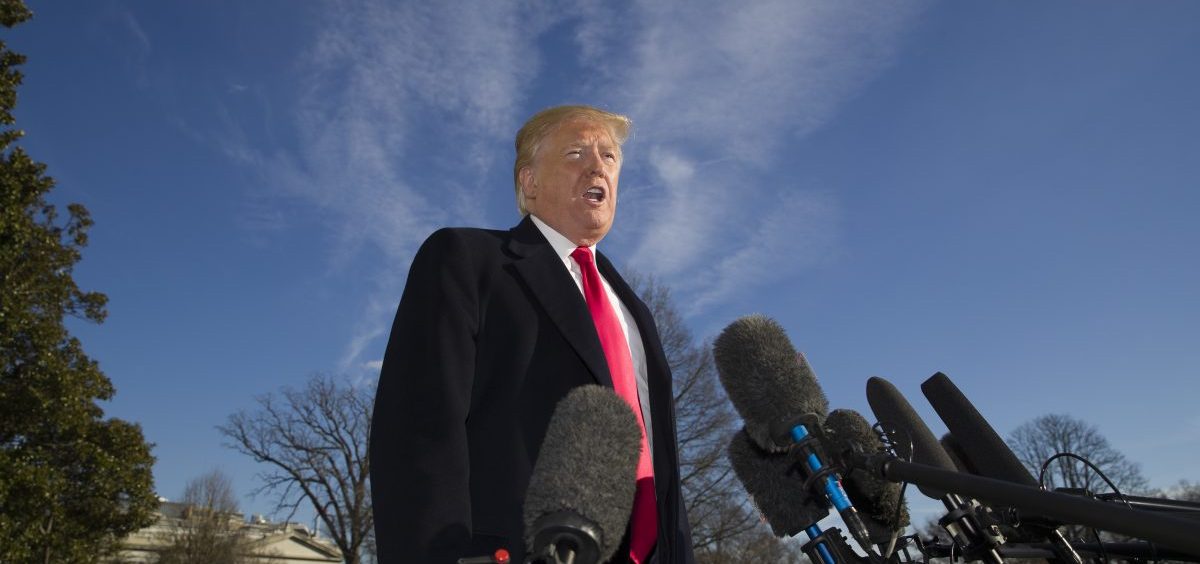News

WOUB to Carry Trump Address on Border As Shutdown Drags Into 3rd Week
By: Scott Horsley | Jessica Taylor | Marie Andrusewicz | NPR
Posted on:
Updated at 1/8/19 11:45 a.m. ET
WOUB Public Media will broadcast live coverage of President Trump’s address to the nation tonight, January 8, at 9:00 p.m. ET on the WOUB-FM radio network as well as on WOUB-TV.
The president will speak from the Oval Office regarding the government shutdown and border security. The coverage will also include analysis and a Democratic response. The television coverage is expected to last 30 minutes.
For television viewers, the regular scheduled prime-time programming will be seen in its entirety following the speech.
Updated at 3:12 p.m. ET
The White House is planning a media blitz as President Trump pushes for a wall along the southern border, which congressional Democrats have repeatedly rebuffed. This week’s events involving the president come as a partial shutdown of the federal government drags into its third week with no apparent end in sight to the impasse.
Trump tweeted he will “Address the Nation on the Humanitarian and National Security crisis on our Southern Border” on Tuesday night. It will be his first Oval Office address as president. White House press secretary Sarah Sanders also announced that Trump will travel to the border on Thursday “to meet with those on the frontlines of the national security and humanitarian crisis.”
A wall on the southern border with Mexico was Trump’s hallmark campaign promise, and he’s under pressure from his base and conservative commentators to deliver. But, unable to obtain the funding he desired for it under a GOP-controlled Congress for the past two years, Trump last month said he would not sign any spending measure that did not contain sufficient funding for construction of the wall. As a result of the standoff, about a quarter of the government shut down on Dec. 22. In 2019, the president’s now hitting even more resistance from the newly-installed Democratic House after a bruising midterm election cycle where Democrats won 40 House seats.
Weekend talks to resolve the shutdown stalemate between Vice President Pence and congressional staffers produced no breakthrough. Although President Trump characterized the talks as “productive,” Democrats said there was no progress.
The White House did formalize its request for $5.7 billion to fund Trump’s border wall. In a letter to lawmakers, the administration said that sum would pay for 234 miles of new barrier — at a cost of roughly $24 million per mile.
The administration is also seeking hundreds of millions of dollars for additional Border Patrol agents, immigration judges, detention beds, drug detection equipment, and to address what it calls “urgent humanitarian needs.”
White House press secretary Sarah Sanders tweeted Monday morning that Trump will travel to the border on Thursday.
Congressional Democrats are resisting the president’s demand for wall funding. In an exercise in political messaging, the House is expected to begin voting Tuesday on a series of bills to reopen shuttered government agencies without additional money for a border barrier. Although a handful of Republican senators from swing states have expressed a desire to end the partial shutdown, Senate Majority Leader Mitch McConnell, R-Ky., is adamant that the Senate will not vote on funding bills that don’t have support from the president.
Meanwhile, Senate Democrats say they will block even bringing up the start of legislative business this week. According to a senior Democratic aide, Minority Leader Chuck Schumer, D-N.Y., has notified the caucus he will vote against proceeding to the first bill of the session because Senate Republicans should instead be bringing up the Democratic-led House-passed bills to reopen the government.
Friday is a scheduled payday for federal workers. If the impasse is not resolved by then, some 800,000 federal employees will miss being paid for the first time during the shutdown.
If the standoff continues into the weekend, it will be the longest shutdown in recent history, with the potential to disrupt tax refund checks and February food stamp benefits provided by the Supplemental Nutrition Assistance Program (SNAP).
NPR congressional correspondent Scott Detrow contributed.
9(MDI4ODU1ODA1MDE0ODA3MTMyMDY2MTJiNQ000))

